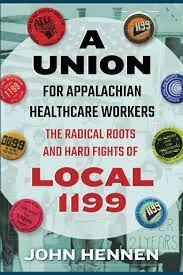The National Union of Hospital and Healthcare Workers was formed in New York City in 1969, but that is such an awkward name that when it first started organizing there, the local it formed, 1199 became the universal name for it. That easier name continued when the union expanded into Pennsylvania, West Virginia, Ohio, Virginia, and Kentucky. This book’s subtitle is key as Hennen begins this book with a look at the radical forces of the 1970s that were spoiling for a fight and prepared to jump to the defense of essential but grossly underpaid and overworked hospital workers. They helped create an atmosphere where a variety of people felt that they deserved social justice and that encouraged workers to feel they were not alone in their struggles. That also is a key lesson for today: progressives and labor leaders maximize their power when they work together! “How did a union of healthcare workers founded in New York City by radical Russian immigrants and composed primarily of Black and Hispanic women gain a powerful foothold in Appalachia despite determined opposition from employers and national and state politicians, as well as the impact of the consolidation of the hospital industry? John Hennen tells this inspiring story in a way that speaks directly to our current moment, when a long era of declining union power may be coming to an end.” --Eric Foner. “Hennen’s engagingly told and well-researched study is a valuable contribution to both American labor history and Appalachian studies.” --Gordon Simmons. John Hennen is Professor Emeritus of History at Morehead State University and the author of The Americanization of West Virginia: Creating a Modern Industrial State, 1916-1925.
Morgantown: West Virginia University Press, 2021. 272 pages with Index, Bibliography, and Notes. Trade Paperback.
